What really lies behind the rise of food banks?
Why record numbers of people are turning to charity for their daily meal
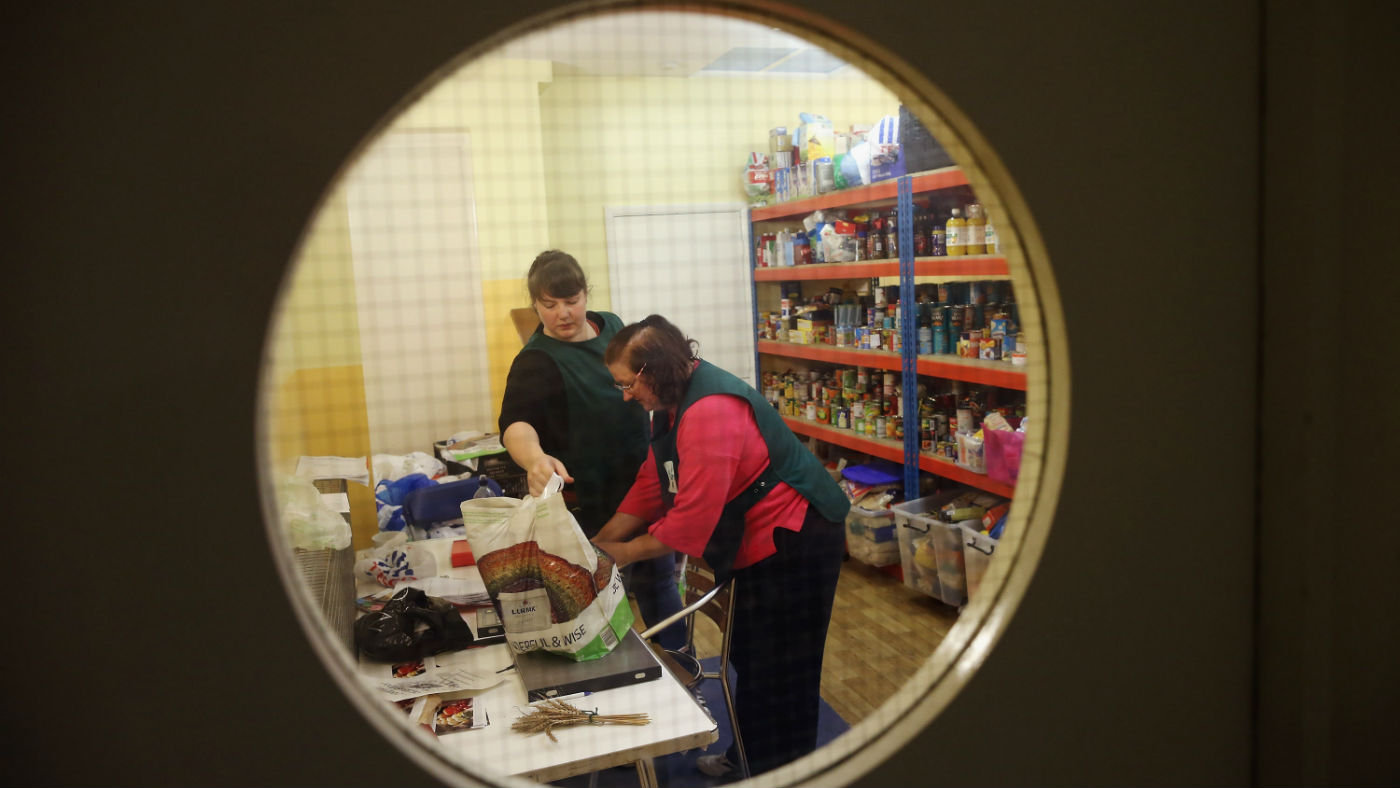
A free daily email with the biggest news stories of the day – and the best features from TheWeek.com
You are now subscribed
Your newsletter sign-up was successful
Britain's food banks say they are being used by record numbers, with more than half a million people relying on them at some point in the past year.
The government rejects suggestions that changes to the welfare system are largely to blame for rising food poverty in one of the wealthiest countries in the world, but charities say otherwise.
How many people use food banks?
The Week
Escape your echo chamber. Get the facts behind the news, plus analysis from multiple perspectives.

Sign up for The Week's Free Newsletters
From our morning news briefing to a weekly Good News Newsletter, get the best of The Week delivered directly to your inbox.
From our morning news briefing to a weekly Good News Newsletter, get the best of The Week delivered directly to your inbox.
The Trussell Trust, which runs the largest network of food banks in the UK, says it provided 1,182,954 three-day emergency parcels to people in crisis in 2016-17, up 6.4 per cent on the previous year's total of 1,109,000.
This marks the ninth successive year that demand has risen, says The Guardian.
"This is a measure of volume rather than unique users and on average, people needed two food-bank referrals," says the charity, which means nearly 600,000 people used its services during the last year.
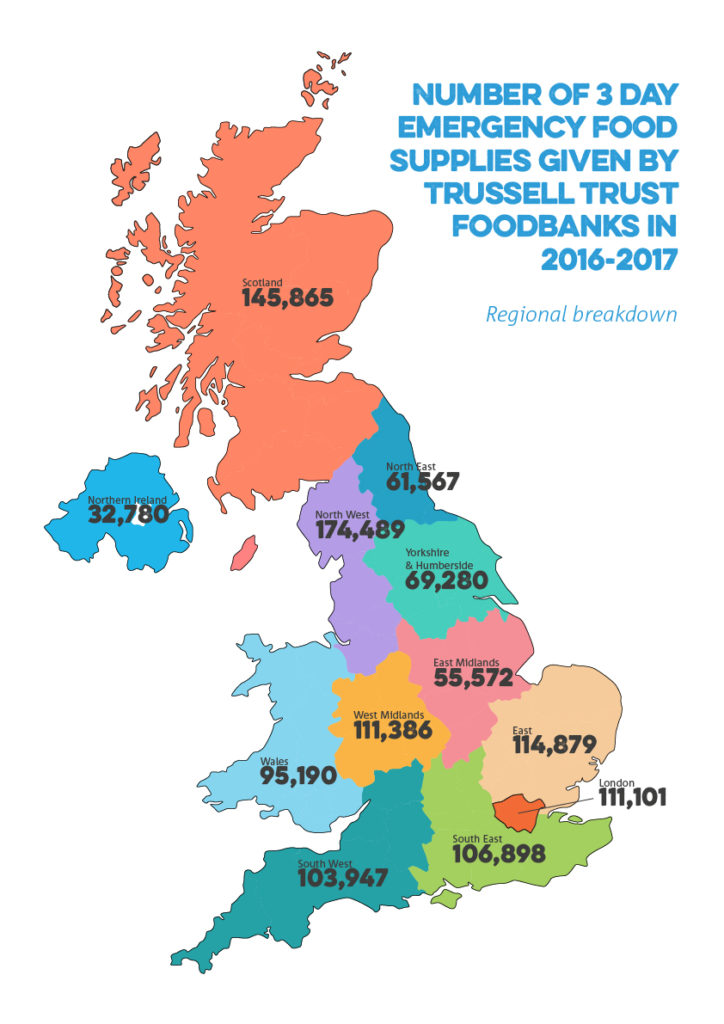
Graphic courtesy Trussell Trust
A free daily email with the biggest news stories of the day – and the best features from TheWeek.com
However, the real figure is thought to be much higher, as the trust is believed to account for just half of the nation's food banks.
Churches, mosques and smaller charities also provide help to many more people each year. Research by the Independent Food Aid Network year suggests the level of food-bank use "is far greater than headline figures indicate," the Guardian says.
"[There] are at least 651 grassroots food banks operating independently of the Trussell network, ranging from tiny voluntary groups that give out a few food parcels each week, to larger charity operations that hand out thousands of parcels to hundreds of clients each year."
There are no official government figures on food-bank usage. The Department for Work and Pensions (DWP) says it "does not monitor the use of food banks and has no plans to do".
Who uses food banks?
The largest study on food-bank use to date, conducted by Oxford University and King's College London and commissioned by the Trussell Trust, provides a detailed portrait of the people who require emergency food assistance.
"The most typical users are single men, single women and lone mothers with children - between them accounting for about two-thirds of all food bank users," the BBC reports.
Roughly five out of six are unemployed and depend on benefits to survive.
"Particularly concerning are the very high numbers of disabled people or people with mental health problems needing food banks," said David McAuley, chief executive of tThe Trussell Trust.
More than half of households requiring food aid included a disabled person, with mental health conditions affecting people in a third of all households.
Why do people use food banks?
"Most people are only a paycheque away from a crisis," Daphine Aikens, founder of the Hammersmith and Fulham Foodbank, told the New Statesman. Debt, job loss, illness, insecure work and low wages all contribute to rising food poverty and insecurity.
However, according to data from the Trussell Trust, the largest drivers are delays and changes to welfare benefits, including sanctions that can see payments deferred for several weeks.
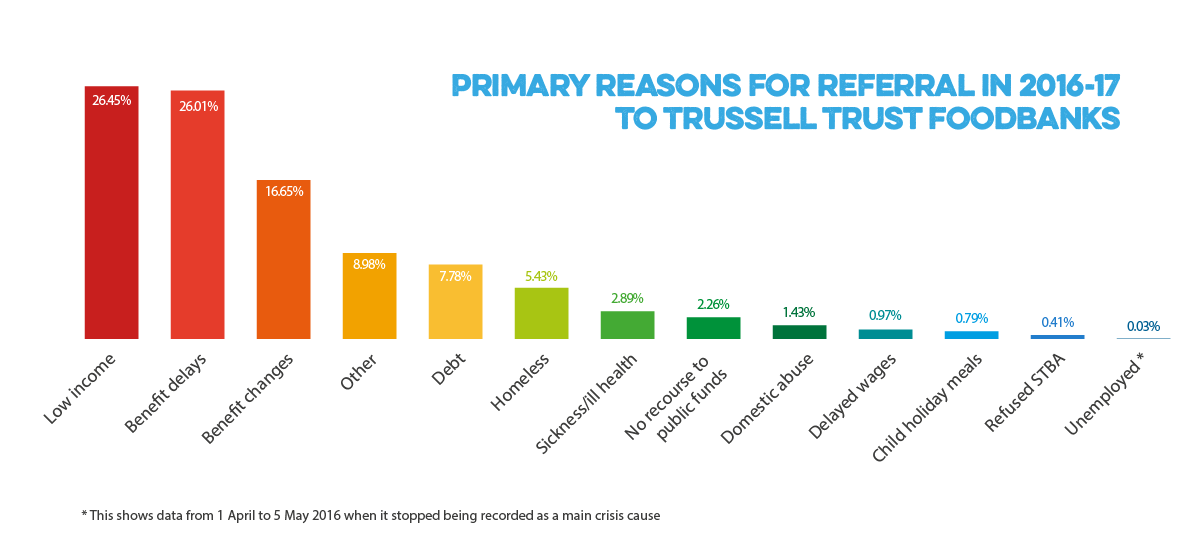
Graphic courtesy Trussell Trust
Food-bank referral rates were more than double the national average in areas already using universal credit, the Guardian says.
"Food banks are responding to a need that has always existed but welfare reform has exacerbated that," the charity's Ewan Gurr told the BBC a few years ago.
This was supported more recently by the Oxford study, which concluded that "there is concern, and increasingly, evidence, that these [two factors] are linked."
However, the DWP strongly denies links between government policies and increased food-bank usage.
Echoing comments made by Theresa May, a spokesperson said: "The reasons for food bank use are complex, so it's misleading to link them to any one issue."
They offered no further explanation of what those "complex" reasons might be.
Who is right?
Clearly there are many different causes of food insecurity in the UK. However, the evidence analysed in the Oxford study supports the claim that welfare reform – and specifically sanctions and delays in payments – is one of the main reasons people are turning to food banks to help feed their families.
-
 Kia EV4: a ‘terrifically comfy’ electric car
Kia EV4: a ‘terrifically comfy’ electric carThe Week Recommends The family-friendly vehicle has ‘plush seats’ and generous space
-
 Bonfire of the Murdochs: an ‘utterly gripping’ book
Bonfire of the Murdochs: an ‘utterly gripping’ bookThe Week Recommends Gabriel Sherman examines Rupert Murdoch’s ‘war of succession’ over his media empire
-
 Gwen John: Strange Beauties – a ‘superb’ retrospective
Gwen John: Strange Beauties – a ‘superb’ retrospectiveThe Week Recommends ‘Daunting’ show at the National Museum Cardiff plunges viewers into the Welsh artist’s ‘spiritual, austere existence’
-
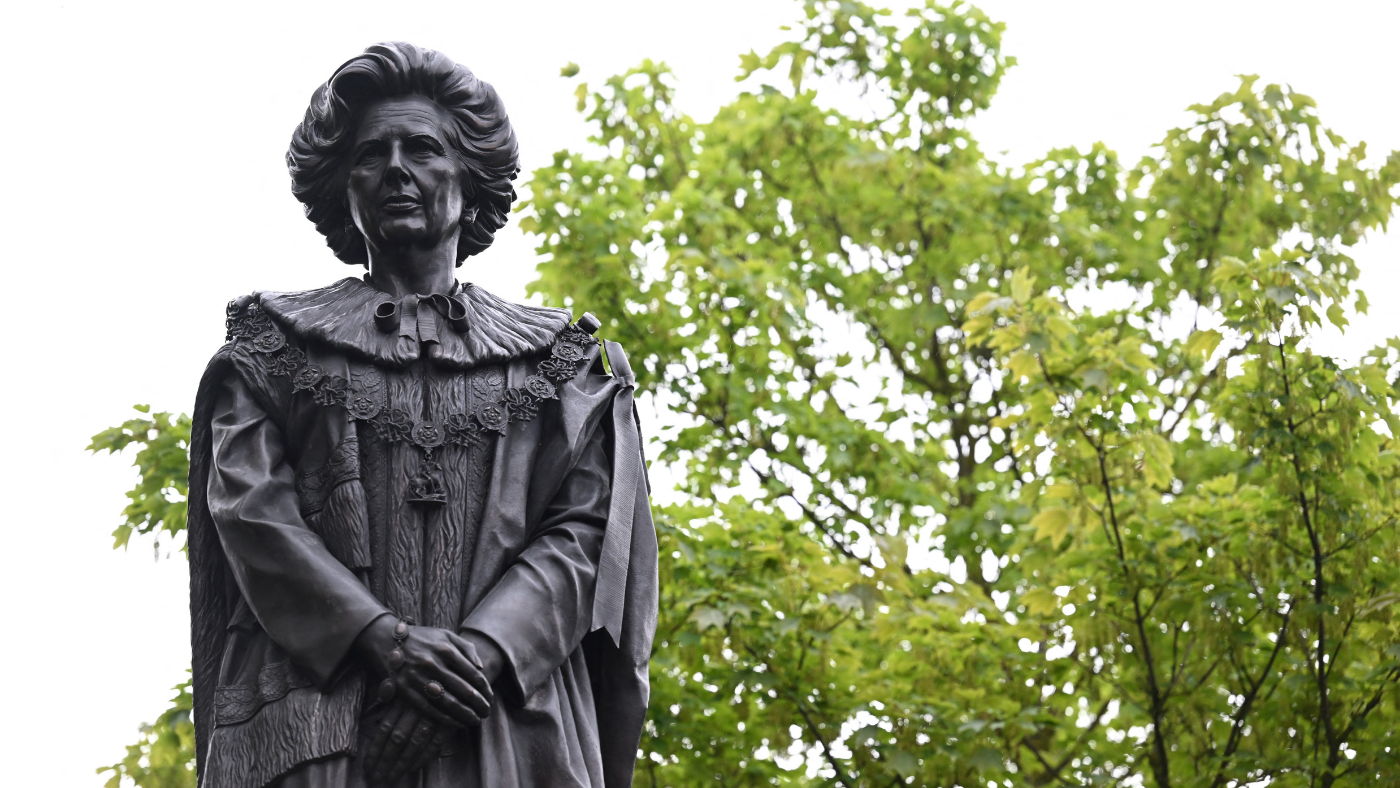 ‘Was a new statue of Thatcher really a wise idea?’
‘Was a new statue of Thatcher really a wise idea?’Instant Opinion Your digest of analysis from the British and international press
-
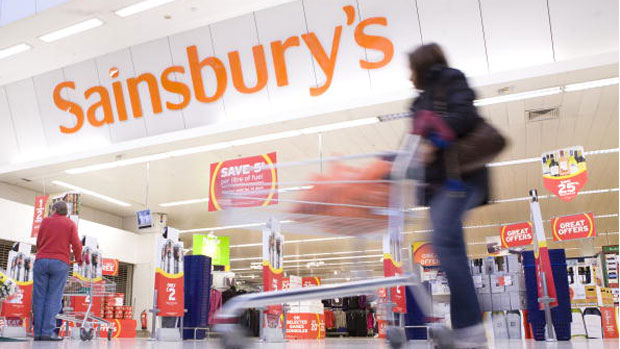 Sainsbury’s to label ‘food bank friendly’ products
Sainsbury’s to label ‘food bank friendly’ productsSpeed Read Retailer found that donations trebled during trial scheme
-
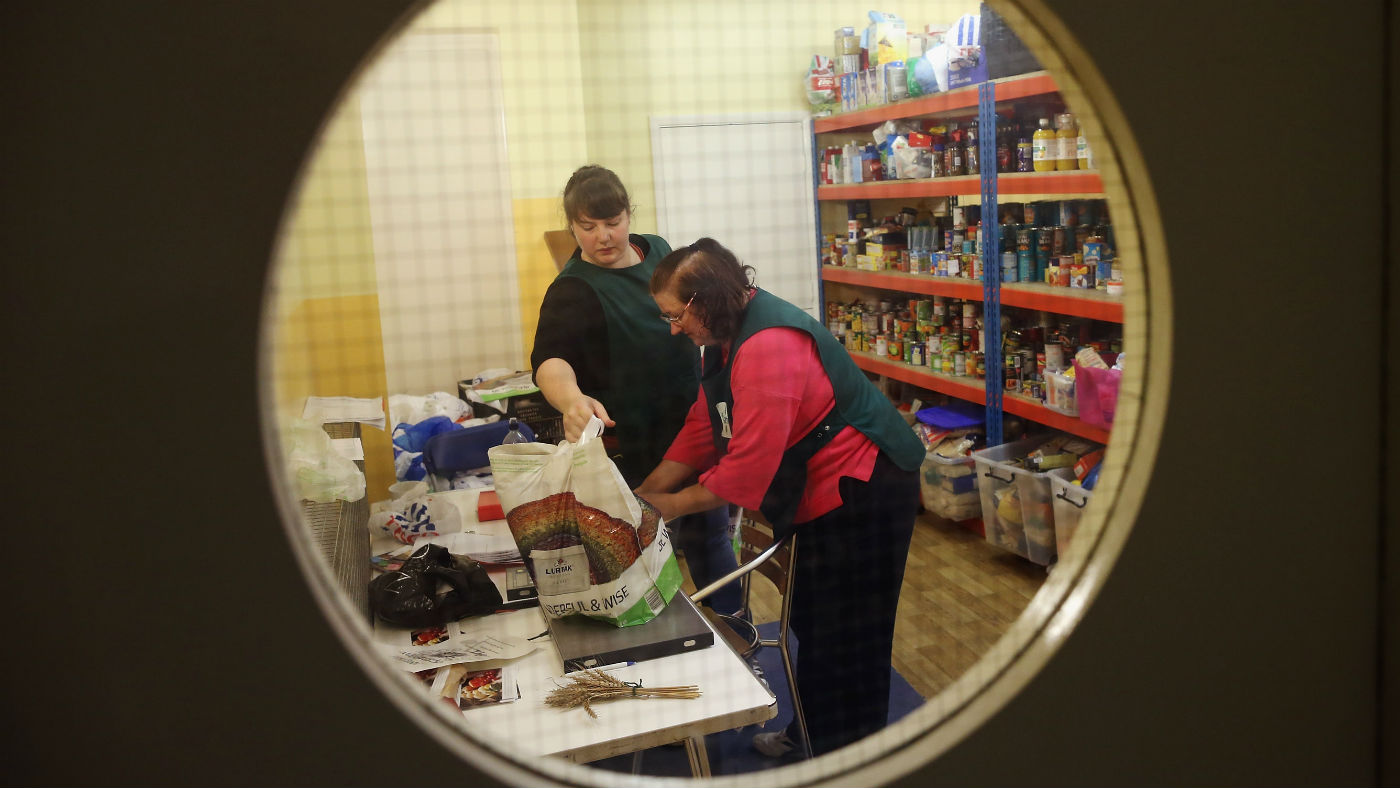 Government tells Jobcentre staff not to record foodbank referrals
Government tells Jobcentre staff not to record foodbank referralsSpeed Read Directive means ‘ministers able to avoid awkward questions on impact of welfare reforms’
-
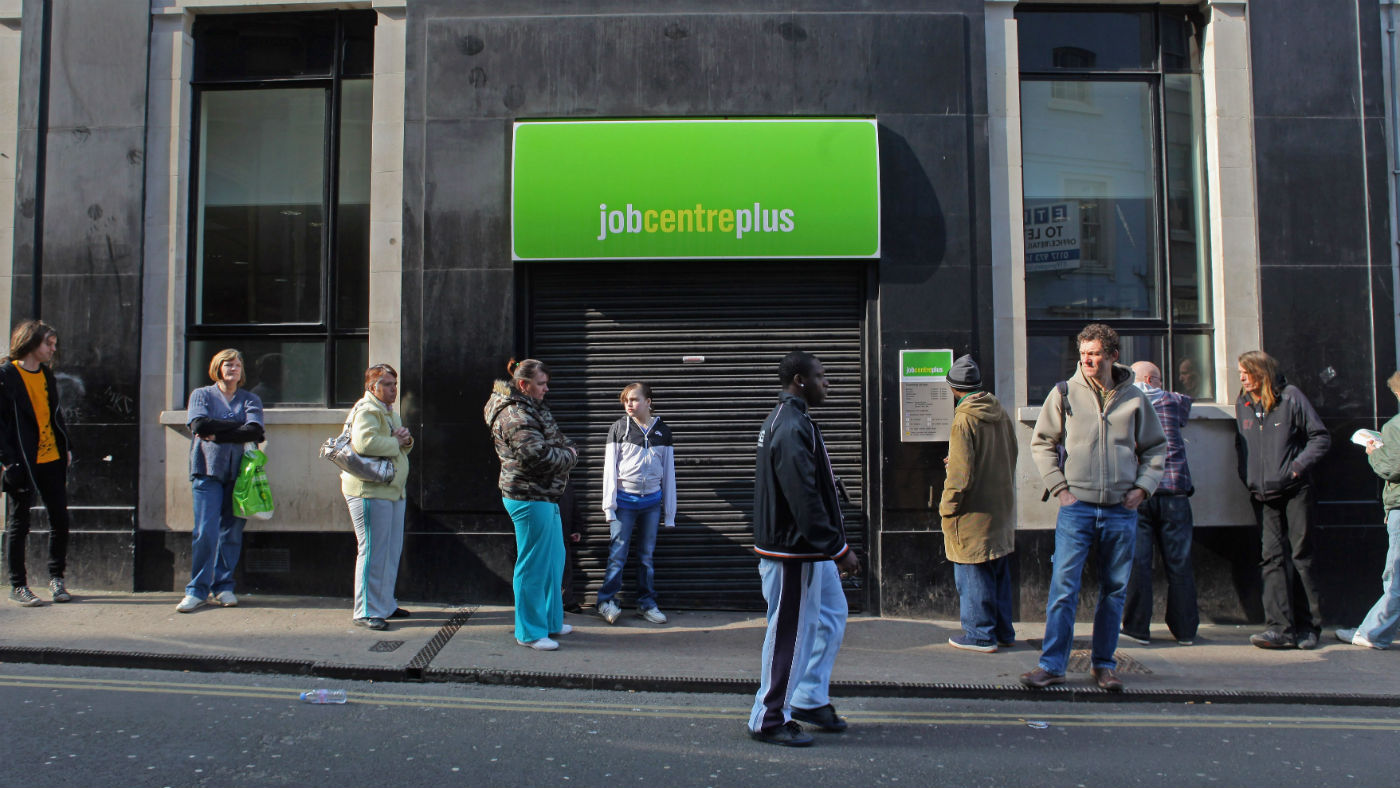 Universal credit failings leave thousands in debt
Universal credit failings leave thousands in debtSpeed Read ‘Complex’ flagship welfare programme forcing people into rent arrears - and food banks
-
 Half of young mothers skip meals to feed their children, study says
Half of young mothers skip meals to feed their children, study saysSpeed Read Young Women's Trust says 'shocking' numbers of are having to turn to food banks to get by
-
 Food banks: benefit sanctions blamed for rising hunger
Food banks: benefit sanctions blamed for rising hungerIn Depth Government told to do more to achieve a hunger-free Britain by church-backed parliamentary report
-
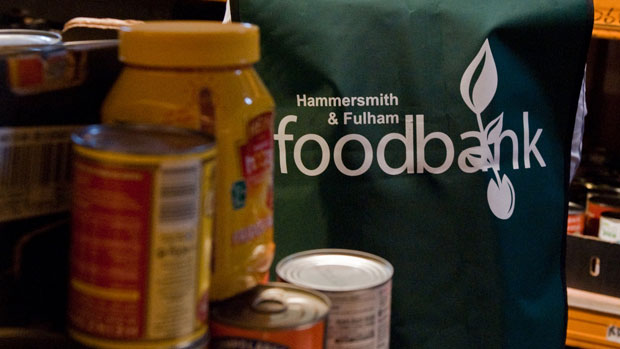 Church calls for action on national food poverty 'crisis'
Church calls for action on national food poverty 'crisis'Speed Read Number of people receiving food parcels almost tripled last year, but ministers deny benefits cut link